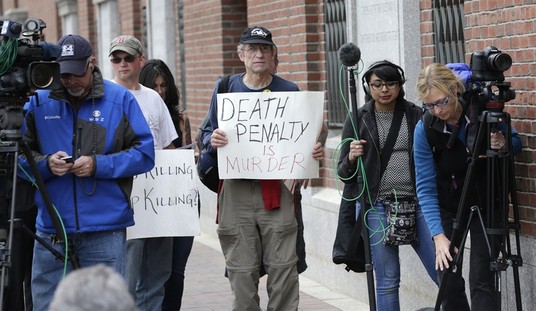A shooting in the Greektown area of Toronto Monday evening killed two and injured 13 more victims:
#BREAKING: Toronto police have identified the 10-year-old girl killed in the Danforth shooting as Julianna Kozis of Markham. pic.twitter.com/iBwCr7B0Ma
— 680 NEWS Toronto (@680NEWS) July 25, 2018
CP24 has learned the identity of one of the victims killed in last night's mass shooting on the Danforth: 18-year-old Reese Fallon https://t.co/RuhQPZYYg4 pic.twitter.com/tfOaP0aMTk
— CP24 (@CP24) July 23, 2018
On Tuesday, Canadian authorities identified the mass shooter as Faisal Hussain:
BREAKING: Canadian officials identify suspect in Toronto mass shooting as Faisal Hussain of Toronto.
— The Associated Press (@AP) July 23, 2018
Early on Wednesday, ISIS claimed credit for Monday’s attack, calling Hussain a “soldier of the Islamic State”:
1. The Islamic State has issued a bulletin on its Amaq News Agency, claiming responsibility for the attack in Toronto which left two dead. The shooter is described as “a soldier of the Islamic State” & they say he responded to “the call” to target citizens of Coalition countries pic.twitter.com/hR9F6IEmce
— Rukmini Callimachi (@rcallimachi) July 25, 2018
But later in the day, New York Times reporter Rukmini Callamachi claimed that because Hussain killed himself immediately following the attack, he could not possibly have been inspired by ISIS:
8. Citing a police source, Global News reports that the gunman committed suicide. If so, this is an important clue suggesting Hussain was not an ISIS-inspired attacker. As @CruickshankPaul and others have explained, suicide is a big no-no for jihadists. https://t.co/pd1OTd71dx
— Rukmini Callimachi (@rcallimachi) July 25, 2018
Now, alert readers might be a bit confused here. Not only did ISIS claim credit for the attack, as seen in the earlier tweet, but Callamachi herself had reported it.
Strangely, Callamachi was on Canadian TV giving an interview earlier today following the ISIS claim of credit acknowledging that, at least from ISIS’s point of view, they were praising Hussain for responding to their call for supporters to conduct attacks at home to terrorize Western countries:
The phrasing that refers to responding to calls to target coalition countries, that refers to a famous speech put out in 2014 by ISIS’s then spokesman Abu Muhammad Al-Adnani, where they called on people who could not travel to the Islamic State who were still back home in Western countries and elsewhere in the world to carry out attacks in situ, in their own communities, anyway they could. It was in that speech that they spoke about using cars to run people over, even using rocks to use them to smash the heads of their enemies.
So what the phrasing indicates is that from ISIS’ perspective this was a man who was most likely self-radicalized, who was inspired by their propaganda, and not somebody who actually traveled to Syria, or took more concrete direction from the group.
So ISIS had no apparent stated problem with his suicide. And ISIS believed — according to Callamachi — that the attack was in response to their own propaganda. How does the manner of his suicide preclude that Hussain was an ISIS supporter and acting on the group’s call for adherents to conduct attacks in the West?
Well, it doesn’t.
Making the issue even more straightforward, media have reported that evidence shows Hussain may have been an ISIS supporter:
Huge scoops here from @joe_warmington. "Files being reviewed by police include concern Hussain expressed “support” for a web site that was seen as “pro-ISIL,” says a law enforcement source." https://t.co/nhwNmj8fuz
— Ezra Levant 🍁 (@ezralevant) July 24, 2018
More from Joe: "Hussain apparently had been spoken-to by authorities about his online activities. Sources say Toronto Police, the OPP and the RCMP have all had an interest in the now-deceased alleged shooter." https://t.co/nhwNmj8fuz
— Ezra Levant 🍁 (@ezralevant) July 24, 2018
"Sources say police in Toronto and CSIS officials in Ottawa, as well as the RCMP, are looking into his past which sources say include his residence in Afghanistan and Pakistan." https://t.co/nhwNmj8fuz
— Ezra Levant 🍁 (@ezralevant) July 24, 2018
CBS News reported:
[A] law enforcement source told CBS News that Faisal Hussain visited Islamic State of Iraq and Syria (ISIS) websites and may have expressed support for the terrorist group. They were looking into whether Hussain may have lived at one time in Afghanistan and possibly Pakistan, the source said. There is no indication that Hussain was directed by ISIS to carry out the attack.
Authorities have said they have yet to find any direct connection between Hussain and ISIS:
BREAKING: Toronto police chief says investigators have found "no evidence to support" ISIS claim of responsibility for Danforth shooting https://t.co/KJWhdVeypZ pic.twitter.com/Xi1pMwio5L
— CBC Toronto (@CBCToronto) July 25, 2018
When pressed on the matter, Callimachi defended her position by pointing out that Hussain had killed himself after the attack:
He shot himself – meaning with his own hand – in the head. Please cite the Islamic jurisprudence that would justify that.
— Rukmini Callimachi (@rcallimachi) July 26, 2018
Historically, Islam has considered suicide as haram (impermissible). That’s not really in question.
But in recent decades, beginning with the Soviet war in Afghanistan and the rise of Palestinian terror groups in the late 1980s, there has been considerable debate in the Sunni world about whether suicide attacks are not suicide and therefore permissible. A few senior Sunni Islamic clerics, such as the Qatar-based Sheikh Yusuf al-Qaradawi, have endorsed the practice. While it is a minority view in the Islamic world following the 9/11 attacks, it is not without supporters — including the Islamic State.
In fact, ISIS actively recruits for suicide (martyrdom) attacks.
Don’t just take my word for it:
https://twitter.com/BrettMmurphy/status/989695355041218560
Others noted that the acceptability of suicide in conducting attacks among those who endorse such practices (including ISIS) is highly subjective, but is generally based on the utility of the suicide:
Given the existence of suicide vests and VBIEDs, I think most would agree that the "no-no-ness" of suicide in jihadist circles is pretty open to debate. I wrote a Master's paper on this.
— C. August Elliott (@CAugustElliott) July 26, 2018
Key point to note here is the distinction b. a suicide of no gain (intihar) and a tactical suicide. "Istishhad" = a sacrifice. A rite conducted in exchange for something. To gain something. If there is tactical gain by strapping on the vest then it is seen as halal. No gain=haram
— C. August Elliott (@CAugustElliott) July 26, 2018
Other scholars have noted that jihadist groups like al-Qaeda and ISIS have been openly debating this question for a while.
A blanket assertion that Hussain’s suicide precludes him from having intended to support ISIS is simply not reasonable. To summarize:
- A minority strain within Sunni Islam has justified suicide attacks as permissible martyrdom.
- ISIS operates within this stream of ideology.
- ISIS actively recruits for suicide attacks.
- ISIS itself took credit for Hussain’s attack in Toronto, calling him a “soldier of the Islamic State” who acted in response to their calls for attacks.
ISIS clearly had no problems with, or at least has remained silent about, his subsequent suicide:
https://twitter.com/Doranimated/status/1022309883520212992









Join the conversation as a VIP Member